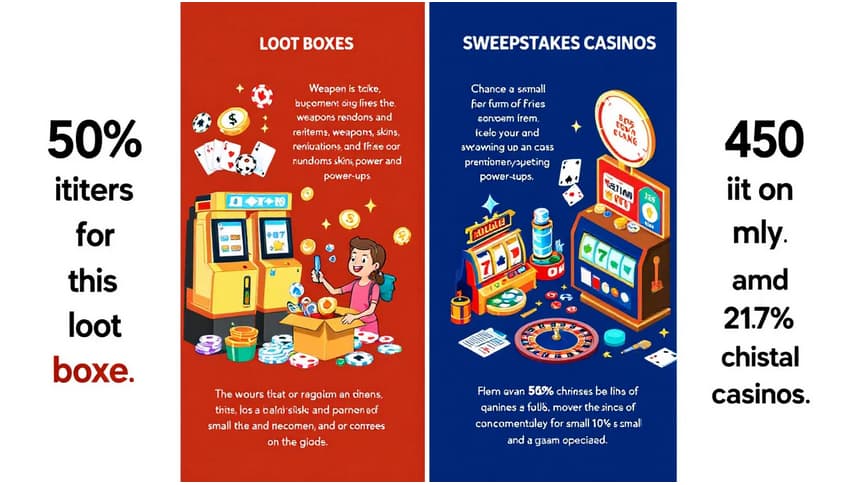In recent years, both loot boxes and sweepstakes casinos have gained attention from players, regulators, and the media. Loot boxes in video games and sweepstakes casinos in online gambling may seem like two separate worlds, but they share one important feature: both revolve around chance-based rewards. While loot boxes emerged from the gaming industry as a form of randomized in-game content, sweepstakes casinos—including platforms like Sweeps Casino Sixty6 — evolved within the online gambling space as a legal alternative to traditional casinos in the United States.
Understanding the differences between loot boxes and sweepstakes casinos is crucial for both players and policymakers. Although they both provide the excitement of unpredictability, their regulation, purpose, and outcomes differ significantly. Loot boxes often raise concerns about whether they should be classified as gambling, whereas sweepstakes casinos are firmly rooted in U.S. sweepstakes law, providing them with a unique legal foundation.
There is ongoing competition among regulators and jurisdictions to establish a clear definition and regulatory approach for loot boxes and sweepstakes casinos, with challenges arising from differing laws, regulations, and interpretations of gambling laws. The meaning of loot boxes and sweepstakes casinos varies widely between regions, making consumer protection a key concern, especially as some legal frameworks may leave gaps in safeguarding vulnerable users. Marketing and advertising practices for these products are also under scrutiny, particularly regarding how these platforms advertise their services in ways that appeal to minors and the similarities to gacha games, which further complicate regulatory efforts.
This article examines the workings of loot boxes and sweepstakes casinos, their similarities and key differences, and what the future may hold for both.

What Are Loot Boxes?
Loot boxes are virtual containers in video games that offer players randomized rewards. Typically, these rewards, or prizes, include cosmetic items such as character skins, weapon upgrades, or in-game currencies. While they can be earned through gameplay, many games allow players to purchase loot boxes using real money or in-game credits, making in-game purchases a core part of the mechanic. Items obtained from loot boxes can sometimes be exchanged or purchased for profit through secondary markets, raising questions about their legal status.
The appeal of loot boxes comes from the mystery factor: players don’t know what the outcome will be until the box is opened. This element of unpredictability keeps players engaged and often encourages repeat purchases. Players typically hope to win a valuable prize, and the sense of anticipation can be addictive, much like the excitement associated with slot machines or lottery draws. However, due to the randomized nature of loot boxes, players can lose significant amounts of money or end up losing more than they win, making it easy to lose track of spending. For developers, loot boxes became a highly profitable monetization strategy, especially in free-to-play games.
Loot boxes first gained traction in online multiplayer games during the mid-2000s. Titles like Overwatch, FIFA Ultimate Team, and Call of Duty popularized the concept, making it a central feature in modern gaming. However, as their prevalence grew, so did the controversy surrounding their resemblance to gambling. Loot boxes are often considered gambling in some jurisdictions, especially when in-game purchases are involved and items can be exchanged or purchased for profit. They are sometimes compared to the mechanics of a lottery or slot machine, and spending limits are proposed as a measure of consumer protection.
The system is often designed in a way that results in players losing, with the odds stacked against them, making it almost inevitable for most players to lose. Loot boxes are present in many online games, including gacha games, and concerns have been raised about their impact on children and the need for age restrictions to prevent underage access. Regulatory bodies and consumer groups regularly review loot box practices to assess their compliance with laws and consumer protection standards.
What Are Sweepstakes Casinos?

Sweepstakes casinos are online platforms that mimic the look and feel of traditional casinos but operate under a different legal framework. Unlike real-money casinos, sweepstakes casinos use a dual currency system. Players purchase gold coins for entertainment purposes and receive sweeps coins as a bonus, which can be used to play games and later redeemed for prizes or cash. These sweeps coins can be exchanged for prizes or money, and this exchange is central to the sweepstakes model.
This unique model enables sweepstakes casinos to operate legally in most U.S. states, even in areas where traditional online casinos are still restricted. By functioning under sweepstakes law, these platforms avoid being classified as gambling, since players technically enter sweepstakes contests rather than wager real money directly. Sweepstakes casinos offer a range of services, including daily rewards, free coin events, and promotional bonuses, to attract players. A company operating a sweepstakes casino can profit legally by structuring its platform to comply with sweepstakes laws.
For many players, sweepstakes casinos provide a fun and legal way to enjoy casino-style gaming without the risks associated with unregulated gambling. Their accessibility and legitimacy have fueled rapid growth across the U.S. online gaming market. Regulatory bodies and consumer groups periodically review these platforms to ensure compliance and transparency.
Loot Boxes vs Sweepstakes Casinos: Similarities
At first glance, loot boxes and sweepstakes casinos seem unrelated, but they share several core similarities. Both rely heavily on the psychology of chance and reward, creating a loop of anticipation and excitement that keeps players coming back. In both cases, outcomes are unpredictable, and the allure lies in the possibility of winning something valuable, whether that’s a rare in-game item or redeemable coins. These activities take place on loot box and sweepstakes casino sites, which serve as digital venues where chance-based gaming occurs. Both models create a sense of hope and excitement, with players hoping for a favorable outcome each time they participate.
Both models also encourage repeat participation. Gamers may buy multiple loot boxes in hopes of unlocking rare content, while sweepstakes casino players might keep purchasing coin packages to extend gameplay and increase their odds of winning. While playing, players may repeatedly spend money, often believing they might get lucky with the next purchase or spin. Additionally, both have been criticized for their monetization strategies, as players can easily spend more than intended.
Here’s a breakdown of their common features:
– Chance-based outcomes
– Virtual or digital rewards
– Player engagement through anticipation
– Monetization strategies
Loot Boxes vs Sweepstakes Casinos: Key Differences
Regulation and Legality
One of the biggest differences between loot boxes and sweepstakes casinos is how they are regulated. Loot boxes often fall into a legal gray area. Different countries and jurisdictions have their own laws, gambling laws, and gambling regulations that decide whether loot boxes are classified as gambling. For example, the Chinese government has implemented specific rules on loot boxes, including transparency requirements and restrictions aimed at protecting minors. The definition of gambling varies across regions, contributing to ongoing competition among regulators to address these issues. Some countries, such as Belgium and the Netherlands, classify loot boxes as a form of gambling and restrict their use. In the U.S., regulation varies by state and remain a hotly debated issue. In many cases, the individuals responsible for ensuring compliance with these regulations face little to no legal consequences if violations occur, highlighting gaps in enforcement.
In contrast, sweepstakes casinos operate under established U.S. sweepstakes law. Because players are not directly wagering money for a chance to win, these platforms avoid the gambling classification and remain accessible nationwide, except in a handful of states where gambling is restricted.
Rewards and Value
Loot boxes provide only in-game, non-monetary rewards. While these items may enhance gameplay or status, they cannot be converted into real money. Some critics view certain loot box systems as the worst examples of unfair or unethical gaming practices, citing their lack of transparency and potential for exploitation. Sweepstakes casinos, however, give players a chance to win redeemable prizes or cash by using sweepstakes coins. In these casinos, players can use virtual chips to place bets or participate in betting-style games, with the opportunity to win a prize that can be redeemed for cash or other rewards. The potential for profit through these exchanges is a key difference between sweepstakes casinos and loot boxes. This creates a tangible value that loot boxes do not offer.
Audience and Purpose
Loot boxes are primarily designed for gamers, especially younger audiences, who enjoy customization and in-game progression. Loot boxes are particularly popular among young people and minors, raising concerns about age-appropriate content and exposure to gambling-like mechanics. Protecting children from these risks is a growing focus for regulators, as weak age verification systems can allow minors to access gambling-like features. Sweepstakes casinos, on the other hand, target players seeking a gambling-like experience with real rewards, making them more appealing to adults interested in casino-style games.
Here’s a side-by-side comparison:
| Feature | Loot Boxes | Sweepstakes Casinos |
|---|---|---|
| Rewards | In-game items only | Coins redeemable for prizes/cash |
| Legality in the U.S. | Varies, often debated | Legal under sweepstakes law |
| Audience | Gamers (including children and minors) | Casino players |
| Spending Model | Microtransactions | Purchase + free sweepstakes entry |
Are Loot Boxes Gambling?
The question of whether loot boxes constitute gambling remains a topic of debate worldwide. Several countries have already ruled that loot boxes constitute gambling because players pay real money for a chance to win randomized rewards. In these jurisdictions, loot boxes are considered gambling based on the definition provided by their gambling laws and gambling regulations. Some regulators compare loot boxes to lotteries or slot machines when deciding their legal status, noting similarities in chance-based outcomes and psychological effects. Ongoing reviews and legal debates continue to shape the definition and regulation of loot boxes. Belgium and the Netherlands, for example, have banned or restricted them.
In the U.S., loot boxes have not been classified as gambling on a federal level. However, ongoing lawsuits and state-level discussions continue to push for stricter regulations. Critics argue that loot boxes expose younger audiences to gambling-like mechanics, which could normalize risky spending habits and are, essentially, gambling in disguise, according to many regulators and experts.
Why Sweepstakes Casinos Are Legal in the U.S.
Sweepstakes casinos thrive under U.S. sweepstakes law, which permits companies to conduct promotional contests where participants can win prizes without making a mandatory purchase. Companies offering sweepstakes casinos must comply with specific rules and regulations governing gambling to operate legally. Since players can obtain sweeps coins for free via mail-in methods, these casinos avoid being categorized as traditional gambling. These companies offer a range of services, including free coin events, daily rewards, and promotional offers, to attract and retain players. Regulatory bodies periodically review each company to ensure compliance with all relevant laws and regulations governing gambling. If a sweepstakes casino is found to be in violation, the consequences are often limited. Typically, the company may face warnings or minor penalties, but in many cases, significant legal action does not occur.
This legal framework makes sweepstakes casinos accessible in nearly every state, excluding just a few jurisdictions with stricter rules. For U.S. players, this means they can enjoy casino-style games, including slots and poker, in a safe and compliant environment.
The benefits of sweepstakes casinos include transparency, accessibility, and a regulated path to winning real rewards—features that make them an appealing alternative to restricted online casinos.
The Future of Loot Boxes and Sweepstakes Casinos
Looking ahead, loot boxes face increasing scrutiny from regulators, especially as concerns about underage exposure and gambling addiction grow. Future regulations may include spending limits and enhanced consumer protection measures to safeguard vulnerable players. Marketing and advertising practices will likely face stricter oversight to prevent illegal activities and ensure transparency about loot box mechanics, odds, and risks. Game developers may need to adapt by making loot box mechanics more transparent or replacing them with other monetization models. Companies that adapt quickly to new regulations can gain a competitive advantage in the evolving market.
On the other hand, sweepstakes casinos are gaining popularity as a legal, entertaining alternative for U.S. players. With more states unlikely to legalize traditional online casinos in the short term, sweepstakes casinos are likely to continue expanding as the primary way Americans engage in real-money-style gaming online.
In the future, we may see stricter regulation of loot boxes and even more growth for sweepstakes casinos as players seek legal, rewarding experiences.
FAQ
Are loot boxes the same as sweepstakes casinos?
No, loot boxes offer in-game items only, while sweepstakes casinos offer redeemable prizes.
Can you win real money with loot boxes?
No, loot boxes don’t provide real-world value. Their rewards are strictly digital and limited to gameplay.
Are sweepstakes casinos legal in the U.S.?
Yes, they operate under sweepstakes law and are legal in most states. Players can redeem sweepstakes coins for prizes or cash.
Why are loot boxes controversial?
Because they resemble gambling and have a potential impact on young players, critics argue that they exploit psychological triggers and encourage overspending.
Conclusion
When comparing loot boxes vs sweepstakes casinos, the differences are clear. Loot boxes provide in-game excitement but remain controversial due to their resemblance to gambling and uncertain legal standing. Sweepstakes casinos, however, offer a legitimate path for players to enjoy casino-style gaming with the chance to win real rewards under U.S. sweepstakes law.
For players seeking entertainment with real value, sweepstakes casinos represent a safer, legal alternative. As the debate over loot boxes continues, sweepstakes casinos are well-positioned to grow in popularity.
If you’re curious about trying a legal and rewarding gaming experience, explore sweepstakes casinos responsibly and enjoy the thrill of chance with peace of mind.

